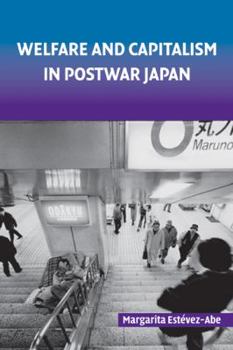Welfare and Capitalism in Postwar Japan
(Part of the Cambridge Studies in Comparative Politics Series)
Select Format
Select Condition 
Book Overview
This book explains how postwar Japan managed to achieve a highly egalitarian form of capitalism despite meager social spending. Estevez-Abe develops an institutional, rational-choice model to solve this puzzle. She shows how Japan's electoral system generated incentives that led political actors to protect, if only for their own self-interested reasons, various groups that lost out in market competition. She explains how Japan's postwar welfare state...
Format:Paperback
Language:English
ISBN:0521722217
ISBN13:9780521722216
Release Date:July 2008
Publisher:Cambridge University Press
Length:360 Pages
Weight:1.15 lbs.
Dimensions:0.9" x 6.0" x 9.1"
Customer Reviews
0 rating





